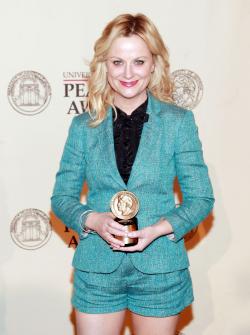Like all self-respecting feminist fans of funny, I worship at the altar of Amy Poehler, whose small-town, Middle-American bureaucrat-turned-city-councilwoman Leslie Knope on Parks and Recreation is one of the most hilarious, positive portrayals of a woman anywhere on television. So I was excited for Smart Girls at the Party, Poehler’s Web series aimed at celebrating “extraordinary individuals who are changing the world by being themselves.”
Spotlighting intelligent young girls who might not fit the Disney Channel or ABC Family mode is a worthy goal. But Smart Girls at the Party feels less like an expression of Poehler’s spiky humor than one of Leslie Knope’s more-earnest and less-successful projects.
The format is simple: Poehler sits down with a pre-teen girl like Anna, an aspiring chef, or Cameron, who writes mysteries, and talks to them about their interests and activities. The interviewees are uniformly charming, but as an interviewer, Poehler doesn’t seem to know how to draw them out or to highlight their talents without seeming a little condescending. Plus, her questions are boring: She asks a girl who’s on to talk about her Bat Mitzvah to explain why family should be important to everyone, a basic, broad and softball question, the equivalent of asking an actor what it felt like to play a role. (And I can’t imagine Poehler likes getting asked that.) During the Cameron episode, Poehler and her crew try to emphasize how impressive Cameron’s approach to writer’s block is by suggesting that they themselves are immature and overly emotional in response to similar challenges. It’s exactly the kind of self-negating behavior Smart Girls at the Party should counter—I don’t think Poehler wants to communicate that these young women should minimize their own accomplishments to make other people feel good, but that’s precisely what she’s doing. Too often Poehler seems to be straining to engineer viral moments, as with her interview with a young feminist here:
The difference between the Ruby video and that public radio reporter’s interview with his daughter about why she gave her sister a terrible haircut is that the latter succeeded by taking the daughter and her motivations and decisions seriously, while Poehler and her cast seem focused on Ruby’s cute-factor.
And that’s the ultimate problem with Smart Girls at the Party: Poehler and her producer treat the subjects like they’re kids getting a chance to sit at the adult’s table for dessert. Acting overly amazed by these girls only plays up their adorableness, rather than presenting them as the future leaders Poehler actually wants them to be.
